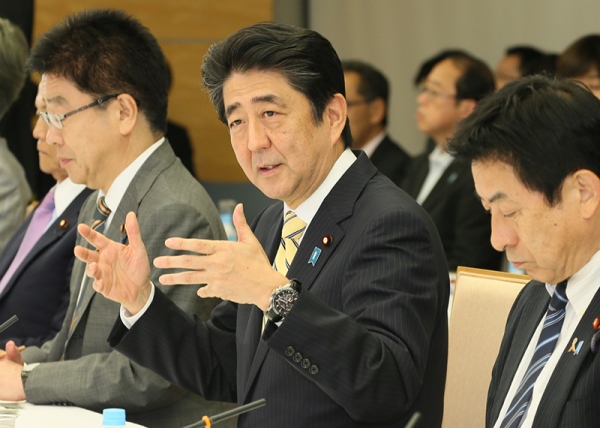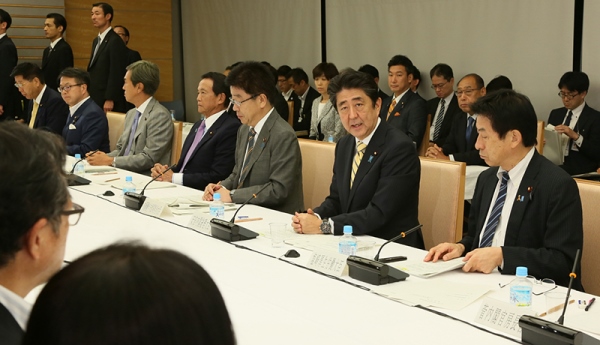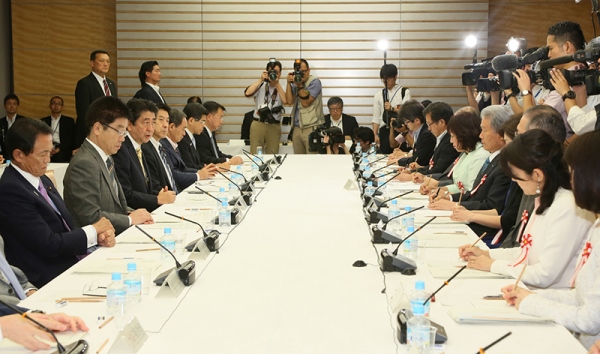Home > News > The Prime Minister in Action > September 2016 > Council for the Realization of Work Style Reform
The Prime Minister in Action
Council for the Realization of Work Style Reform
September 27, 2016
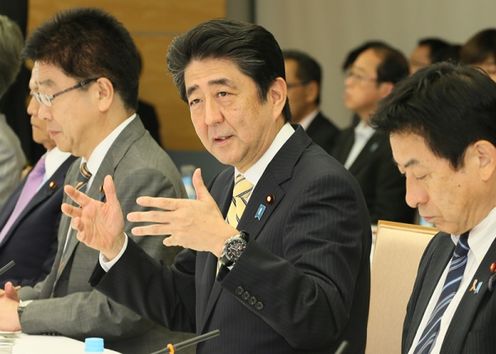
Photograph of the Prime Minister making a statement (1)
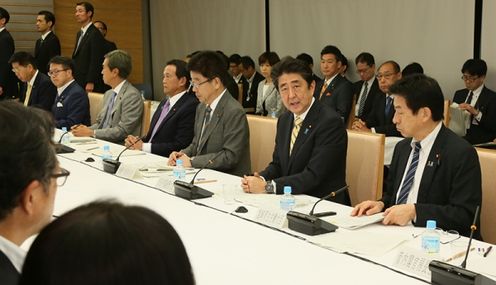
Photograph of the Prime Minister making a statement (2)
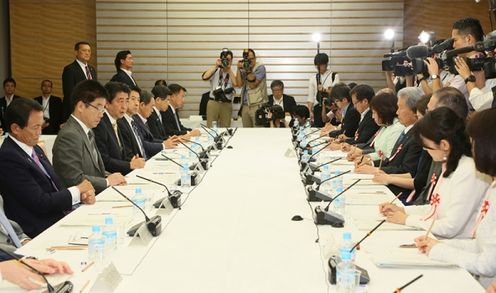
Photograph of the Prime Minister making a statement (3)
[Provisional Translation]
Prime Minister Shinzo Abe held the first meeting of the Council for the Realization of Work Style Reform, at the Prime Minister’s Office.
At the meeting, statements were made by expert members and other participants.
After that, the Prime Minister said,
“The Council for the Realization of Work Style Reform has at last been launched.
Last week, in New York, I had the opportunity to deliver a speech to members of the financial and business communities, and to have discussions with them. They expressed a great deal of interest in the fact that Japan is advancing work style reform. At the same time, they wondered if it is truly possible to achieve this. Work style reform is at the heart of Japan’s corporate culture, and is rooted in the lifestyles of Japanese people and Japan’s way of thinking in regard to work. Taking long work hours as an example, there are many business and work customs that are based on these long work hours, so can these customs really be changed? These are the kinds of doubts that I sensed on that occasion, but in response I said, ‘We will roll up our sleeves to thoroughly tackle this issue.’ Work style reform is a pillar of the structural reforms that comprise the third arrow of Abenomics. Speed and implementation are of the utmost importance. We must not delay these reforms. Many people have been striving to advance work style reform, but have been unable to fully achieve it, even though they were aware that it would positively contribute to a better work-life balance or improved productivity. I am determined that now is precisely the time for us to tackle this issue with the strong belief that we can definitely achieve such reform.
We will consider what the necessary legislation and policies for work style reform are, compile a concrete action plan within this financial year, and submit the relevant legislation to the Diet, with a sense of urgency.
The key to work style reform is to enable workers to have the hope of a better future. We must realize equal pay for equal work, and close the gap between regular and irregular employment, so that young people can have bright hopes for their futures. We must grow the middle class so that they increase their consumption and so that more people can have families. As a result, Japan’s birthrate will improve.
If we amend the long work hours, the work-life balance will improve, and it will become easier for women and senior citizens to find work. Managers will become more interested in the various ways in which people can work for them, and labor productivity will improve. I believe that work style reform is the best means of improving labor productivity. Work style reform is not only a social issue, but also an economic one. We must raise the workforce participation rate, and increase wages.
Aspects of work style reform are not limited to equal pay for equal work, or the details of Article 36 of the Labor Standards Act. We must have firmer commitment on the issues. Along with the steady advance in the utilization of digital technology, from robotics to big data and AI, work styles will also definitely change. Based on the views of the experts in attendance here today, I would like this Council to focus on the following nine areas of work style reform in the immediate future.
First, improvement in the employment conditions of non-regular employees such as by providing equal pay for equal work.
Second, an increase in wages and improvement in productivity.
Third, improvement of long work hours such as by considering a regulatory limit on overtime work.
Fourth, support for career change or reemployment opportunities to industries with the capacity to absorb a large amount of employment, fostering human resources, and ensuring that disparities do not become entrenched through education.
Fifth, flexible work styles such as tele-working, side jobs, and multiple jobs done in conjunction.
Sixth, creating an environment where it is easy for women and young people to work, such as social security and taxation systems that are neutral in terms of work style.
Seventh, promoting employment among the elderly.
Eighth, facilitating a balance between medical treatment, or childrearing and caregiving, and work.
Ninth, the issue of the acceptance of foreign personnel.
I hope that all of the expert members of this Council will continue to proactively provide recommendations, based on their wealth of experience and ideas. Thank you very much.”

